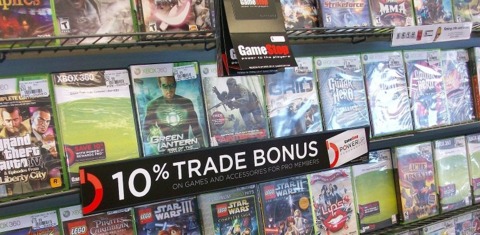Used Games Not Surging, But Outcry Is
GameStop financials suggest second-hand market's slice of the industry barely larger than a decade ago, despite hullabaloo from publishers and developers.
While game sales have been down across the board this year, industry hand-wringing over the used market is at an all-time high thanks in part to rumors that Microsoft and Sony could block used games from playing in their next consoles.
In February, Volition design director Jameson Durall said the industry could "fall apart" due to used game sales, adding that in his mind, a next-gen console that blocks used software would be "fantastic." That was followed up by word from Silicon Knights founder Denis Dyack, who said in March that secondhand sales are cannibalizing the business, and that "there's not going to be an industry" if used sales continue. And in April, Crytek director of creative development Rasmus Hoejengaard said from a business perspective, a next-gen console that curbs used games would be "awesome."
Publishers and developers alike clearly have used games on their minds now more than ever, but is there a good reason for it? We looked at GameStop's financial reports from the last decade to get an answer to that question. Below is an annual breakdown of the firm's revenue from used games.
Fiscal 2002: $296.4 million
Fiscal 2003: $403.3 million
Fiscal 2004: $511.8 million
Fiscal 2005: $808.0 million
Fiscal 2006: $1.31 billion
Fiscal 2007: $1.59 billion
Fiscal 2008: $2.03 billion
Fiscal 2009: $2.4 billion
Fiscal 2010: $2.47 billion
Fiscal 2011: $2.62 billion
As the chart shows, GameStop has raked in more and more cash every year from used games in the past decade without a single exception. For GameStop's latest fiscal year, the company took in $2.62 billion from used games, nearly nine times the $296.4 million it tallied during fiscal 2002. This increase is attributable to a number of factors, including GameStop's takeover of EB Games in 2005, the overall growth of the gaming industry over that same time frame, the firm's expansion into overseas and digital markets, and other factors.
But while GameStop is making more and more money every year from the sale of second-hand games and peripherals, it hasn't grown much at all relative to the rest of the company. Take a look at these charts to see just how little: 
In the past decade, GameStop's used business is only 5.5 percent more of the company's revenues, and the year-to-year change has never been more than 3.6 percent. It hasn't been constantly growing, either. It peaked at 27.8 percent in the company's fiscal 2004, just at the tail end of the last console cycle. Once the Xbox 360 launched, it gradually declined to 22.4 percent in fiscal 2007. Since then, it has trended upward, with GameStop drawing 27.4 percent of its fiscal 2011 from used games. That's just about even with the percentage second-hand products accounted for late in the last console cycle.
Granted, GameStop does not encompass the entire worldwide second-hand market. And though it is just one player in the used sector, the company controls 90 percent of the market and are "the only ones that matter," Wedbush analyst Michael Pachter told GameSpot.
"Now that publishers can control it to an extent, they're building it up as a bigger problem than ever."
So why the increased discussion when the data suggests that used games make up about the same piece of the pie as they did a decade ago? The biggest change is that publishers now feel they have ways to thwart the market. Chief among these changes are downloadable content programs that keep gamers holding on to their discs while publishers drip-feed new content out over the space of many months, and online pass initiatives that force second-hand players to pay $10 to play games online. And this--coupled with audience fears that next-gen consoles will block or in some way curb used games--has led to the increased discussion.
When used games were a fact of life, companies like EA, Sony, Microsoft, and others accepted that and moved on. Now, in 2012, when the sale of used games is something that can conceivably be controlled for a profit, these companies are building it up as a bigger problem than ever. EA, in particular, is capitalizing on the Used Game Problem all the way to the bank; the firm tallied a record $1.2 billion in digital receipts for fiscal 2011. This was bolstered in part by, you guessed it, the firm's chief used game demotivators: subscription fees and DLC.
Got a news tip or want to contact us directly? Email news@gamespot.com

Join the conversation